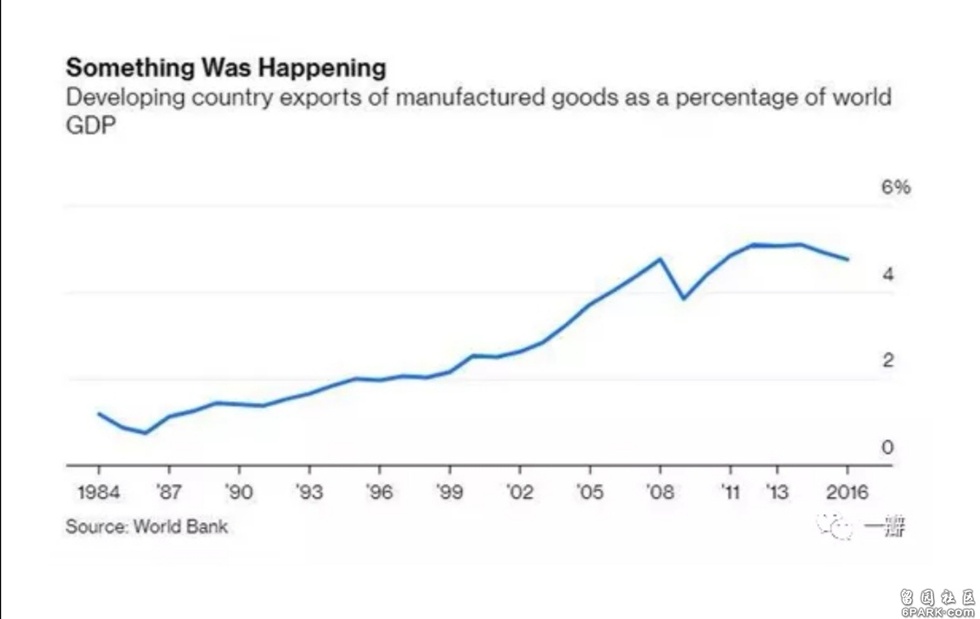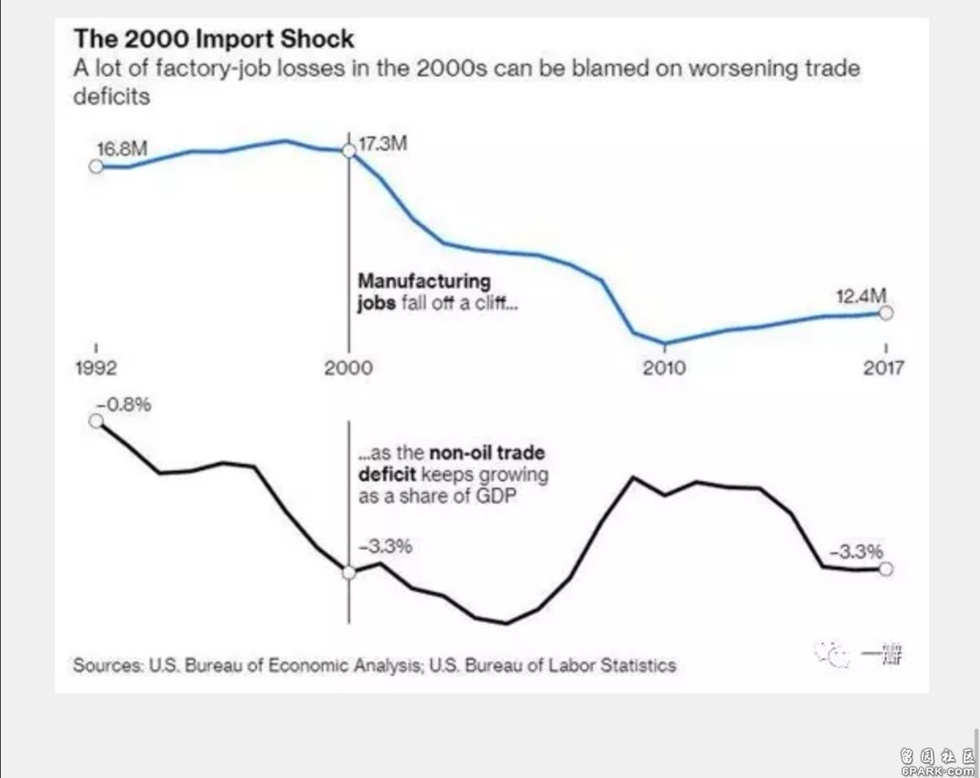

| 送交者: 笨啊笨[♂☆★★DoctorateCandidate★★☆♂] 于 2019-10-29 21:01 已读 3566 次 | 笨啊笨的个人频道 |
What economists (including me) got wrong about globalization
??对于全球化,经济学家(包括我)错在哪里? 6park.com??作者:Paul Krugman 翻译:陈达飞 6park.com??Concerns about adverse effects from globalization aren’t new. As U.S. income inequality began rising in the 1980s, many commentators were quick to link this new phenomenon to another new phenomenon: the rise of manufactured exports from newly industrializing economies. 6park.com??对全球化不利影响的担忧并非新鲜事。随着美国的收入不平等现象在20世纪80年代开始加剧,许多评论员很快将这一新现象与另一新现象联系起来:新兴工业化经济体制造业出口的增长。 6park.com??Economists took these concerns seriously. Standard models of international trade say that trade can have large effects on income distribution: A famous 1941 paper showed how trading with a labor-abundant economy can reduce wages, even if national income grows. 6park.com??经济学家们非常重视这些焦虑。根据国际贸易的标准模型,贸易对收入分配有很大的影响:1941年一篇著名的论文表明,与劳动力充裕的经济体进行贸易会降低工资,即使(本国)国民收入会增长。 6park.com??And so during the 1990s, a number of economists, myself included, tried to figure out how much the changing trade landscape was contributing to rising inequality. They generally concluded that the effect was relatively modest and not the central factor in the widening income gap. Soacademic interest in the possible adverse effects of trade, while it never went away, waned. 6park.com??因此,在20世纪90年代,包括我在内的一些经济学家试图找出贸易格局的变化在多大程度上加剧了不平等。他们普遍认为,这种影响相对较小,不是收入差距扩大的核心因素。因此,学术界对贸易可能产生的不利影响的兴趣,虽然从未消失过,但已经减弱。 6park.com??In the past few years, however, worries about globalization have shot back to the top of the agenda, partly due to new research and partly due to the political shocks of Brexit and U.S. President Donald Trump. And as one of the people who helped shape the 1990s consensus——that the contribution of rising trade to rising inequality was realbut modest—— it seems appropriate for me to ask now what we missed. 6park.com??然而,在过去的几年里,对全球化的担忧已经回到了议程的首位,部分原因是由于新的研究成果,部分是由于英国脱欧和美国总统特朗普的政治冲击。作为帮助形成20世纪90年代共识的人之一——贸易增长对不平等加剧的贡献是真实的,但并不严重——我似乎应该问一下:我们忽略了什么? 6park.com??The 1990s Consensus 6park.com??20世纪90年代的共识 6park.com??There was confusion and debate during the mid-1990s overhow to use data on trade to assess wage impacts. Most studies focused on the volume of trade and the amount of labor and other resources embedded in importsand exports. Some economists objected to this approach, preferring to focus on prices rather than quantities. 6park.com??1990年代中期,人们对如何利用贸易数据评估工资影响有许多困惑和争论。大多数研究都集中在贸易量、劳动力和其他进出口资源上。一些经济学家反对这种做法,他们更愿意关注价格而不是数量。 6park.com??What eventually emerged was a “but for” approach: asking how different wages would have been but for the rise of manufactured exports from developing countries——increases that were minimal in 1970 but higher by the mid-1990s. It turned out that imports of manufactured goods from developing countries, while much larger than in the past, were still small relative to the size of advanced economies——around 2% of their gross domestic products. This wasn’t enough to cause more than a modest change in relative wages. The effect wasn’t trivial, but it wasn’t big enough to be a central economic story, either. 6park.com??最终出现的是一种“非此即彼”的方法:考察如果没有发展中国家制成品出口的增长,工资会有多大的变化,这种增长在1970年是最低的,但在1990年代中期变高了。结果发现,来自发展中国家的制成品进口虽然比过去多得多,但是与发达经济体的规模相比仍然很小——约占其国内生产总值的2%。这还不足以引起相对工资的较大变化。其影响并非微不足道,但也不足以成为最核心的经济故事。 6park.com??Hyperglobalization 6park.com??超级全球化 6park.com??These assessments of the impact of trade made around 1995, inevitably relying on data from a couple of years earlier, were probably correct in finding modest effects. In retrospect, however, trade flows in the early 1990s were just the start of something much bigger, or what a 2013 paper byeconomists Arvind Subramanian and Martin Kessler called hyperglobalization. 6park.com??这些对1995年前后的贸易影响的评估,不可避免地依赖于在这之前年份的数据,其结果发现影响是适度的,这很可能是正确的。然而,20世纪90年代初的贸易流动只是一个更大贸易规模的开端,或者是经济学家阿文德苏布拉曼尼亚和马丁凯斯勒在2013年发表的一篇论文中所称的超级全球化的开端。 6park.com??Until the 1980s, it was arguable that the growth of world trade since World War II had mainly reflected a dismantling of the trade barriers erected before the war; world trade as a share of world GDP was only slightly higher than it had been in 1913. Over the next two decades, however, both the volume and nature of trade moved into uncharted territory. 6park.com??直到1980年代,人们还在认为,二战以来的世界贸易规模的增长主要反映的是二战前贸易壁垒的消除;世界贸易总量占世界GDP的比重只是略高于1913年。然而,在接下来的20多年里,贸易的规模和性质都进入了未知的领域。 6park.com??This chart shows one indicator of this change: manufactured exports from developing countries, measured as a share of world GDP. What seemed in the early 1990s like a major disturbance in the trade force was just the beginning. 6park.com??下图是这一变化的一个指标:发展中国家的制成品出口占全球GDP的比例。上世纪90年代初出现的贸易震荡似乎只是一个开始。 6park.com6park.comWhat caused this huge surge in what was, in the 1990s, still a fairly novel form of trade? The answer probably includes a combination of technology and policy. Freight containerization was not exactly new, but it took time for businesses to realize how the reduction in transshipping costs made it possible to move labor-intensive parts of the production process overseas. Meanwhile, China made a dramatic shift from central planning to a market economy focused on exports. 6park.com??是什么导致了上世纪90年代的这种相当新颖的贸易形式出现了这样快速的膨胀?答案可能是技术和政策的结合。集装箱运输并不是什么新鲜事,但企业需要时间去认识,运输成本的降低如何使生产过程中劳动密集部门转移到海外成为可能。与此同时,中国实现了中央计划经济向以出口为导向的市场经济重大转变。 6park.com??Since manufactured exports from developing countries, measured as a share of the world economy, are now triple what they were in themid-1990s, should we conclude that the effect on income distribution has also tripled? Probably not, for at least two reasons. 6park.com??当前的发展中国家的制成品出口占GDP的比例是1990年代中期的三倍,我们是否应该得出结论说,对收入分配的影响也增加了三倍?可能不是,至少有两个原因。 6park.com??First, a significant part of the increase indeveloping-country exports reflects the rapid growth of trade among the modernizing economies of Asia, Africa and Latin America. That’s an important story, but it’s not relevant to the impact on advanced-country workers. Even more important, though, the nature of this trade growth — involving goods made by both unskilled and highly skilled workers — means that the value of the labor involved in North-South trade hasn’t risen nearly as fast as the volume. 6park.com??第一,发展中国家出口增长的很大一部分反映了亚洲、非洲和拉丁美洲新兴经济体之间贸易的迅速增长。这很重要,但它与对发达国家工人的影响没有关系。更重要的是,贸易增长的性质——包括非熟练工人和高技能工人生产的产品——意味着,南-北贸易所带来的劳动收入的增长并没有其贸易规模增长的那么快。 6park.com??Consider two cases: imports of apparel from Bangladesh and imports of iPhones from China. In the first instance, we are in effect importing the services of less educated workers, putting downward pressure onthe demand for such workers in the U.S. In the second case, though, most of thevalue of the iPhone reflects work done in high-wage, high-education countries like Japan; we are in effect importing skilled as well as unskilled labor, sothe impact on income distribution should be much smaller. 6park.com??考虑两种情况:从孟加拉国进口服装和从中国进口苹果手机。首先,我们实际上是在进口受教育程度较低的工人的服务,这使得美国对这类工人的需求下降了。第二种情况,苹果手机的大部分价值反映了像日本这样高工资、高教育水平的国家的劳动,我们实际上是在同时引进熟练劳动力和非熟练劳动力,因此对收入分配的影响就小得多。 6park.com??Despite these qualifications, it’s clear that the impact of developing-country exports grew much more between 1995 and 2010 than the 1990s consensus imagined possible, which may be one reason concerns about globalization made a comeback. 6park.com??尽管有这些限定性条件,但很明显,1995年至2010年之间发展中国家出口的影响比1990年代普遍认为的情形要大的多,这可能是对全球化的担忧卷土重来的原因之一。 6park.com??Trade Imbalances 6park.com??贸易失衡 6park.com??One contrast between the way scholars measure globalization’s impact and the way the broader public looks at it — the approach taken by Trump, for example — is the focus on trade imbalances. The public tends to see trade surpluses or deficits as determining winners and losers. But the economic trade models that underlay the 1990s consensus gave norole to trade imbalances at all. 6park.com??学者们衡量全球化影响的方式,与更广泛的公众看待全球化的方式——例如特朗普采取的方式——之间的对比,集中体现在贸易失衡上。公众认为贸易顺差或逆差就是赢家或输家。但作为支撑上世纪90年代形成的共识的经济贸易模型却没有留给贸易失衡任何角色。 6park.com??The economists’ approach is almost certainly right for the long run, both because countries must pay their way eventually, and because trade imbalances mainly affect the relative shares of traded and nontraded sectors in employment, with no clear effect on the overall demand for labor. Yet rapid changes in trade balances can cause serious problems of adjustment——a broader theme that I’ll return to shortly. 6park.com??从长远来看,经济学家的方法几乎肯定是正确的,这既是因为各国最终必须有所付出,也是因为贸易不平衡主要影响贸易和非贸易部门在就业中的相对份额,对整体的劳动力需求没有明确的影响。然而,贸易平衡的快速转变可能会导致严重的调整问题——这是一个更广泛的主题,下文我会再到谈这个问题。 6park.com??Consider, in particular, the comparison between the U.S. non-oil trade balance (which is overwhelmingly manufactured goods) and U.S. manufacturing employment: 6park.com??让我们来特地考察一下美国非石油贸易收支(绝大多数是制成品)与美国制造业就业之间的比较: 6park.comUntil the late 1990s, employment in manufacturing, although steadily falling as a share of total employment, had remained more or less flat in absolute terms. But manufacturing employment fell off a cliff after 2000, and this decline corresponded to a sharp increase in the non-oil deficit. 6park.com??一直到20世纪90年代末,制造业的就业在总就业中所占的比例虽然稳步下降,但从绝对值来看,仍是稳定的。但2000年后,制造业就业断崖式下降,其趋势与非石油工业的贸易赤字的快速增加正好相对应。 6park.com??Does the surge in the trade deficit explain the fall inemployment? Yes, a lot of it. A reasonable estimate is that the deficit surge reduced the share of manufacturing in GDP by around 1.5 percentage points, or more than 10%, which means that it explains more than half the roughly 20% decline in manufacturing employment between 1997 and 2005. 6park.com??贸易逆差的激增是否可以解释了就业的下降?是的,很多。一个合理的估计是,不包括石油在内的贸易赤字的激增使制造业在国内生产总值中所占的份额下降了约1.5个百分点,或10%以上,这意味着它可以解释1997年至2005年间制造业就业下降的20%中的一半以上。 6park.com??This is over a relatively short time period and focuses on absolute employment, not the employment share. Trade deficits explain only a small part of the long-term shift toward a service economy. But soaring imports did impose a shock on some U.S. workers, which may have helped cause the globalization backlash. 6park.com??这考察的是一个相对较短的时间段,重点考察的是就业的绝对量,而不是就业的份额。贸易逆差是解释向服务型经济转变的一小部分原因,但飙升的进口确实给一些美国工人带来了冲击,这可能促成了全球化的反复。 6park.com??Rapid Globalization and Disruption 6park.com??迅速全球化及其破坏 6park.com??The pro-globalization consensus of the 1990s, which concluded that trade contributed little to rising inequality, relied on models that asked how the growth of trade had affected the incomes of broad classes of workers, such as those who didn’t go to college. It’s possible, and probably even correct, to think of these models as accurate in the long run. Consensus economists didn’t turn much to analytic methods that focus on workers inparticular industries and communities, which would have given a better picture of short-run trends. This was, I now believe, a major mistake——one in which I shared a hand. 6park.com??1990年代支持全球化的共识认为,贸易对不平等的加剧贡献甚微,但它所依赖的模型考察的是贸易的增长将如何影响不同阶层的劳动者的收入,例如那些没有上过大学的工人。从长远来看,这些模型很可能是正确的。经济学家们并没有形成这种共识,即转向于考察贸易对特定行业和社区的工人的影响的分析方法,这些方法本可以更好地描绘短期趋势。我现在相信,这是一个重大的错误——一个我与他人共同的错误。 6park.com??It should have been obvious that the politics of globalization were likely to be much more influenced by the experience of individual sectors that gained or lost from shifting trade flows than by big questions of how trade affects the global blue-collar/white-collar wage gap or the broad statistical measure of inequality known as the aggregate Gini coefficient. 6park.com??显然,全球化的政治可能更多地受到个别部门(或行业)从贸易中得利或受损的影响,而不是受到贸易如何影响全球蓝领/白领工资差距的重大问题,或是被基尼系数所衡量的广泛的不平等的统计指标的影响。 6park.com??This is where the now-famous 2013 analysis of the “China shock” by David Autor, David Dorn and Gordon Hanson comes in. What they mainly did was shift focus from broad questions of global income distribution to the effects of rapid import growth on local labor markets, showing that these effects were large and persistent. This represented a new and important insight. 6park.com??这就是2013年著名的大卫?奥特尔、大卫?多恩和戈登?汉森对“中国冲击”的分析。他们的研究主要做的是将焦点从更为广泛的全球收入分配问题转移到进口快速增长对当地劳动力市场的影响,结果表明这些影响是巨大的和持续的。这代表了一种全新的以及重要的视角。 6park.com??To make partial excuses for those of us who failed to consider these issues 25 years ago, at the time we had no way to know that either the hyperglobalization that began in the 1990s or the trade-deficit surge a decade later were going to happen. And without the combination of these developments, the China shock would have been much smaller. Still, we missed acrucial part of the story. 6park.com??我们这些25年前没有考虑这些问题的人能找到的一些借口是,在当时,我们不知道20世纪90年代会出现超全球化,或者是10年后贸易逆差会激增。如果没有这些变化,中国的冲击会小得多。不过,我们还是把故事最核心的部分讲错了。 6park.com??A Case for Protectionism? 6park.com??保护主义的理由? 6park.com??What else did the 1990s consensus miss? A lot. Developing-country exports of manufactured goods grew far beyond their level at the time that consensus emerged. The combination of this rapid growth and surging trade imbalances meant that globalization produced far more disruptionand cost for some workers than the consensus had envisaged. 6park.com??上世纪90年代的共识还遗漏了什么?很多。发展中国家的制成品出口增长远远超过了共识的水平。这种快速增长和不断加剧的贸易不平衡的结合,意味着全球化给一些工人带来的干扰和成本远远超出了共识的设想。 6park.com??Does this mean that Trump is right and a trade war would be in the interests of workers hurt by globalization? 6park.com??这是否意味着特朗普是对的,贸易战将有利于被全球化伤害的工人? 6park.com??No. This answer is based not so much on some rigid commitment to free trade as on the nature of the losses that globalization imposed. The problem with surging globalization wasn’t so much changing demand for labor as the disruption that was caused by some of the most rapid changes in history. Rapid change now appears to be largely behind us: Many indicator ssuggest that hyperglobalization was a one-time event, and that trade has moreor less stabilized relative to world GDP. You can see it leveling off in the first chart above. 6park.com??不,这个答案与其说是基于对自由贸易的某种坚定的承诺,不如说是基于全球化造成的损失的性质的理解。全球化浪潮带来的问题与其说是劳动力需求的变化,不如说是历史上一些最迅速的变化造成的混乱。现在,这种变化好像已经褪去了:许多指标表明,超全球化是一个一次性的事件,贸易相对于全球国内生产总值或多或少已经稳定下来。你可以在上面的第一张图表中看到它稳定了。 6park.com??As a result, major disruptions now would be more likely to come from an attempt to reverse globalization than from leaving the current trade regime in place. At this point, millions of decisions about where to put plants,and where to move and take jobs, have been made on the assumption that the open world trading system will continue. Making that assumption false, by raising tariffs and forcing a contraction of world trade, would set off a whole new wave of disruption along with a whole new set of winners and losers. 6park.com??结果是,现在的主要干扰可能更多地来自于逆全球化思潮和行动,而不是改变现有的贸易体制。数以百万计的关于在何处建厂、向何处迁移和找工作的决定是在开放的世界贸易体系将继续存在的前提下做出的,提高关税和迫使世界贸易收缩,使这一前提变不存在了,这将引发一场全新的破坏浪潮,同时带来一系列新的赢家和输家。 6park.com??So while the 1990s consensus on the effect of globalization hasn’t stood the test of time, its shortcomings don’t make a case for protectionism now. We might have done things differently if we had known what was coming, but that’s not a good reason to turn back the clock. 6park.com??所以,虽然20世纪90年代关于全球化影响的共识没有经受住时间的考验,但它的缺点并不能成为保护主义的理由。假如我们知道未来会发生什么,我们可能会做一些不同的选择,但这并不意味着倒行逆施。


